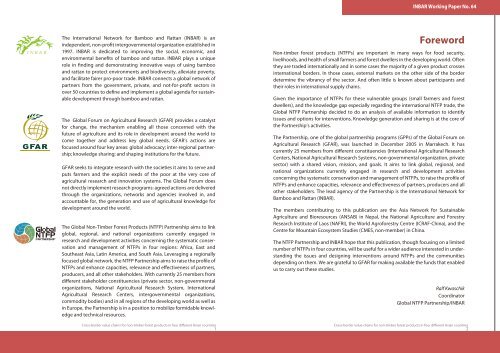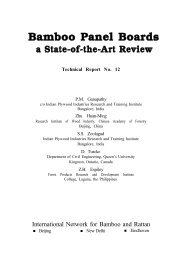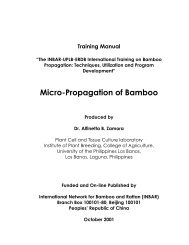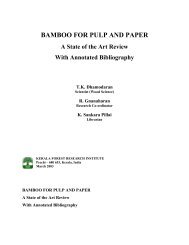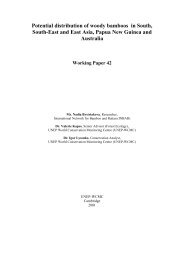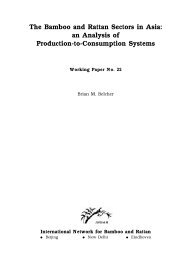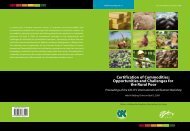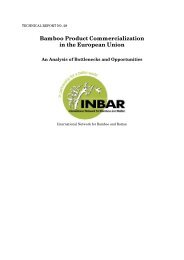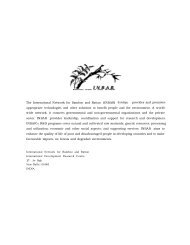Cross-border NTFP value chains - International Network for Bamboo ...
Cross-border NTFP value chains - International Network for Bamboo ...
Cross-border NTFP value chains - International Network for Bamboo ...
Create successful ePaper yourself
Turn your PDF publications into a flip-book with our unique Google optimized e-Paper software.
The <strong>International</strong> <strong>Network</strong> <strong>for</strong> <strong>Bamboo</strong> and Rattan (INBAR) is an<br />
independent, non-prot intergovernmental organization established in<br />
1997. INBAR is dedicated to improving the social, economic, and<br />
environmental benets of bamboo and rattan. INBAR plays a unique<br />
role in nding and demonstrating innovative ways of using bamboo<br />
and rattan to protect environments and biodiversity, alleviate poverty,<br />
and facilitate fairer pro-poor trade. INBAR connects a global network of<br />
partners from the government, private, and not-<strong>for</strong>-prot sectors in<br />
over 50 countries to dene and implement a global agenda <strong>for</strong> sustainable<br />
development through bamboo and rattan.<br />
The Global Forum on Agricultural Research (GFAR) provides a catalyst<br />
<strong>for</strong> change, the mechanism enabling all those concerned with the<br />
future of agriculture and its role in development around the world to<br />
come together and address key global needs. GFAR’s actions are<br />
focused around four key areas: global advocacy; inter-regional partnership;<br />
knowledge sharing; and shaping institutions <strong>for</strong> the future.<br />
GFAR seeks to integrate research with the societies it aims to serve and<br />
puts farmers and the explicit needs of the poor at the very core of<br />
agricultural research and innovation systems. The Global Forum does<br />
not directly implement research programs: agreed actions are delivered<br />
through the organizations, networks and agencies involved in, and<br />
accountable <strong>for</strong>, the generation and use of agricultural knowledge <strong>for</strong><br />
development around the world.<br />
The Global Non-Timber Forest Products (<strong>NTFP</strong>) Partnership aims to link<br />
global, regional, and national organizations currently engaged in<br />
research and development activities concerning the systematic conservation<br />
and management of <strong>NTFP</strong>s in four regions: Africa, East and<br />
Southeast Asia, Latin America, and South Asia. Leveraging a regionally<br />
focused global network, the <strong>NTFP</strong> Partnership aims to raise the prole of<br />
<strong>NTFP</strong>s and enhance capacities, relevance and eectiveness of partners,<br />
producers, and all other stakeholders. With currently 25 members from<br />
dierent stakeholder constituencies (private sector, non-governmental<br />
organizations, National Agricultural Research System, <strong>International</strong><br />
Agricultural Research Centers, intergovernmental organizations,<br />
commodity bodies) and in all regions of the developing world as well as<br />
in Europe, the Partnership is in a position to mobilize <strong>for</strong>midable knowledge<br />
and technical resources.<br />
<strong>Cross</strong>-<strong>border</strong> <strong>value</strong> <strong>chains</strong> <strong>for</strong> non-timber <strong>for</strong>est products in four dierent Asian countries<br />
1<br />
INBAR Working Paper No. 64<br />
Foreword<br />
Non-timber <strong>for</strong>est products (<strong>NTFP</strong>s) are important in many ways <strong>for</strong> food security,<br />
livelihoods, and health of small farmers and <strong>for</strong>est dwellers in the developing world. Often<br />
they are traded internationally and in some cases the majority of a given product crosses<br />
international <strong>border</strong>s. In those cases, external markets on the other side of the <strong>border</strong><br />
determine the vibrancy of the sector. And often little is known about participants and<br />
their roles in international supply <strong>chains</strong>.<br />
Given the importance of <strong>NTFP</strong>s <strong>for</strong> these vulnerable groups (small farmers and <strong>for</strong>est<br />
dwellers), and the knowledge gap especially regarding the international <strong>NTFP</strong> trade, the<br />
Global <strong>NTFP</strong> Partnership decided to do an analysis of available in<strong>for</strong>mation to identify<br />
issues and options <strong>for</strong> interventions. Knowledge generation and sharing is at the core of<br />
the Partnership’s activities.<br />
The Partnership, one of the global partnership programs (GPPs) of the Global Forum on<br />
Agricultural Research (GFAR), was launched in December 2005 in Marrakech. It has<br />
currently 25 members from dierent constituencies (<strong>International</strong> Agricultural Research<br />
Centers, National Agricultural Research Systems, non-governmental organization, private<br />
sector) with a shared vision, mission, and goals. It aims to link global, regional, and<br />
national organizations currently engaged in research and development activities<br />
concerning the systematic conservation and management of <strong>NTFP</strong>s, to raise the prole of<br />
<strong>NTFP</strong>s and enhance capacities, relevance and eectiveness of partners, producers and all<br />
other stakeholders. The lead agency of the Partnership is the <strong>International</strong> <strong>Network</strong> <strong>for</strong><br />
<strong>Bamboo</strong> and Rattan (INBAR).<br />
The members contributing to this publication are the Asia <strong>Network</strong> <strong>for</strong> Sustainable<br />
Agriculture and Bioresources (ANSAB) in Nepal, the National Agriculture and Forestry<br />
Research Institute of Laos (NAFRI), the World Agro<strong>for</strong>estry Centre (ICRAF-China), and the<br />
Centre <strong>for</strong> Mountain Ecosystem Studies (CMES, non-member) in China.<br />
The <strong>NTFP</strong> Partnership and INBAR hope that this publication, though focusing on a limited<br />
number of <strong>NTFP</strong>s in four countries, will be useful <strong>for</strong> a wider audience interested in understanding<br />
the issues and designing interventions around <strong>NTFP</strong>s and the communities<br />
depending on them. We are grateful to GFAR <strong>for</strong> making available the funds that enabled<br />
us to carry out these studies.<br />
Ralf Kwaschik<br />
Coordinator<br />
Global <strong>NTFP</strong> Partnership/INBAR<br />
<strong>Cross</strong>-<strong>border</strong> <strong>value</strong> <strong>chains</strong> <strong>for</strong> non-timber <strong>for</strong>est products in four dierent Asian countries<br />
2


